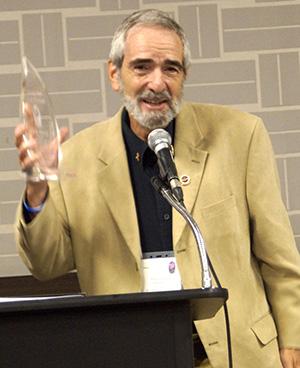Social Work Dean Emeritus honored with Lifetime Achievement Award

A poet and a writer since adolescence, Dr. Nick Mazza was working in the maintenance department of a hospital in New Jersey putting himself through college when he noticed an article in Time magazine on poetry therapy. His curiosity piqued, he wrote to one of the national leaders in poetry therapy, attended a national conference in Brooklyn and found himself hooked. He approached the medical director of the hospital about reading poetry to patients, and the director introduced him to the hospital’s social services department. The rest is history.
“Poetry and creative writing are simply part of who I am,” Mazza explained. “And it is what I wanted to offer to others as they journey through life transitions and search for meaning.”
He finished a bachelor’s degree in English in 1971, and a few years later began working on his master’s degree in social work at Rutgers University. Students and faculty of Rutgers’ social work program were bewildered as to why an English major was studying social work. “My response was ‘In literature, you study the human condition. In social work, you do something about it,’” Mazza said.
Mazza enjoyed his work in social work in a hospital and later a family service agency, before coming to Florida State University to pursue his doctoral degree in counseling psychology. His passion for poetry therapy had never waned, and his doctoral dissertation entitled, “Poetry and Group Counseling: An Exploratory Study” reflected this.
He noted the draw of the strengths-based perspective of poetry therapy that respects both “the story” and uniqueness of individuals and families, but groups and communities as well.
Poetry therapy as a therapeutic approach allowed helping professionals like Mazza (a Florida licensed clinical social worker, psychologist, and marriage & family therapist) to empower their clients through the sharing of poetry (and other forms of literature) and engaging in expressive writing; while also recognizing and emphasizing the development of deeply meaningful and personal symbols and ceremonies.
Mazza utilized poetry therapy in the therapeutic and counseling setting, but also shared it in the academic and research setting. Starting by editing the newsletter for the National Association for Poetry Therapy, he would incorporate brief scholarly items on poetry therapy. This caught the attention of a major publisher, and they offered him an opportunity to make it a regular journal. Mazza founded the Journal of Poetry Therapy, which is now celebrating 30 years in publication. He would also go on to publish the first edition of his book Poetry Therapy: Theory and Practice.
Years of research and leadership, and numerous publications later Mazza retired at the end of 2015from his position as Dean and Patricia V. Vance Professor of Social Work at the FSU College of Social Work. The National Association for Poetry Therapy is acknowledging his impressive 45-year legacy in poetry therapy this year with their first Luminary Award for Lifetime Achievement. He received the award at the annual conference in April 2017 in Denver, Colorado.
Mazza continues this legacy in 2017, publishing the second edition of Poetry Therapy: Theory and Practice in March and the anticipated publication of Expressive Therapies, a 4 volume series coming out in August (published by Routledge). Mazza, an invited scholar on the arts and social work, will be participating in the first Roundtable on Social Work and the Arts in Seattle, WA, June 18-21. He attributes his inspiration to his daughter Nicole (a BSW and MSW graduate from FSU and kindergarten teacher), his son Christopher (who passed away in 2005 but "is always in my heart"), and his grandson Cole Christopher Anderson (22 months old and pure poetry).
A sample of Dr. Nick Mazza’s published poetry from the Journal of Humanistic Education and Development (Issue 26, Page 257, 1998):
Hope
Hope
is the belief
that one hand
reaching to another
can eventually
touch the moon,
allowing the light
to guide us
through the night.
